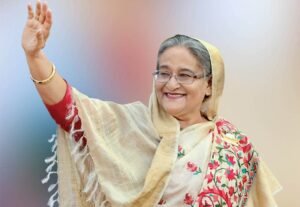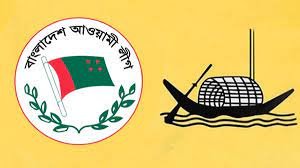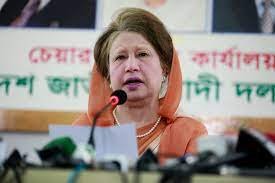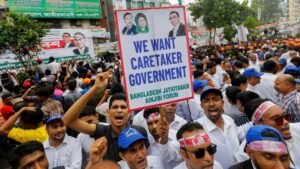Sheikh Hasina, the present Prime Minister of Bangladesh, is predicted to win re-election for a 4th term despite calls for a boycott from BNP, the main opposition party.
The Bangladeshi nation has begun its 12th General elections on 7th January 2024. With over 119 million voters registered, the nation of approximately 170 million people will hold elections. With a scheduled end time of 4 PM, polling started at 8 AM (local time; 2:00 AM GMT). On Monday, the preliminary results are expected.
The country has witnessed a number of incidents of pre-election violence ahead of the general assembly elections. In Bangladesh, two schools and fourteen voting places have been set on fire so far.
The opposition has been harshly suppressed and Sheikh Hasina’s government has been accused of grave human rights breaches; however, the politician is expected to win these elections because there are no strong contenders.
Let’s know more about who is Sheikh Hasina?
The Father of the Nation, Bangabandhu Sheikh Mujibur Rahman, had five children. The eldest, Sheikh Hasina, was born on September 28, 1947, in Tungipara, in the Gopalganj district.
The beginning of Hasina
In 1973, Sheikh Hasina received her degree from the University of Dhaka. Her career in politics has been uneventful. She was chosen as the Government Intermediate Girl’s College Students Union Vice President.

She served as secretary of the Students League Unit of Rokeya Hall and a member of the Students League Unit of Dhaka University. She has taken an active part in every mass movement since she was a student.
On the fatal night of August 15, 1975, Bangabandhu Sheikh Mujibur Rahman, the father of the nation, his wife and three sons were martyred by military officers. Being in West Germany at the time, Sheikh Hasina and her younger sister Sheikh Rehana were the only ones who made it out alive. She later moved to the UK, where in 1980 she launched her campaign against the autocratic government.
The New President of Awami League
In 1981, Sheikh Hasina, who was compelled to live in exile in New Delhi, was unanimously elected President of the Bangladesh Awami League. On May 17, 1981, she eventually made her way back to Bangladesh after six years of exile.
After coming back to her homeland country in 1981, Hasina rose to prominence as a vocal supporter of democracy, leading to multiple instances of her being placed under house arrest.
After all, she managed to get a place in the parliament as the head of the opposition, where she denounced the brutality of military rule and started taking action to protect everyone’s fundamental human rights.
Lieut. Gen. Hussain Mohammad Ershad, the final military chief of Bangladesh, resigned in December 1990 in response to an ultimatum given by Hasina and widely endorsed by the Bangladeshi people.
Hasina’s First Election
Hasina lost the 1991 free general election, which was the first to be contested in Bangladesh in sixteen years, and the leadership of the opposition Bangladesh Nationalist Party (BNP) went to her opponent Khaleda Zia.

Awami League and other opposition parties boycotted the parliament after Hasina and her supporters accused the BNP of being dishonest during the election. This bold act of nonparticipation set off violent protests, which in turn caused political unrest throughout the nation.
Khaleda gave in to pressure that she cede her position to an independent caretaker government that would oversee fresh elections, even though the BNP government refuted all claims of vote manipulation. In June 1996, Hasina was chosen to be the prime minister.
The First Term of Hasina as the Prime Minister
The most noteworthy accomplishments of Sheikh Hasina’s administration between 1996 and 2001 were the 30-year Ganges Water Sharing Treaty with India, the Peace Accord on Chittagong Hill Tracts, the Bangabandhu Bridge, and food security.
She also established social safety nets for the impoverished, landless, and farmers, as well as helpful initiatives for farmers. These included the “One house-One farm” program, Ashrayan for the homeless, Shanti Nibas for elderly, and allowances for troubled women, widows, the crippled, and freedom fighters.
After the term more turmoil surrounded the subsequent election, which saw Khaleda lead an opposition coalition that decisively beat Hasina. Once more, Hasina and the Awami League objected to the election’s results, alleging that they had been rigged. But their complaints were in vain this time.
Khaleda Vs Hasina
After Khaleda came back to power, Hasina carried on working with the Awami League in a politically unstable environment. She was slightly hurt by a grenade attack at a political demonstration in 2004. Hasina was detained in 2007 on suspicion of extortion, which is said to have occurred while she was prime minister, following the declaration of a state of emergency and the cancellation of parliamentary elections by an interim administration supported by the military.

Khaleda was also detained on suspicion of corruption. They were both in prison. In June 2008, Hasina was released from prison; in September, Khaleda did the same. The state of emergency was removed later that year, and on December 29 of that year, general elections were held. Hasina and the Awami League, running against Khaleda and the BNP, swept a sizable majority into the parliament.
The Next stint as PM; economy growth and appraisals
In January 2009, Hasina was sworn in as prime minister. She lost her husband to a protracted illness four months later. Almost 13 years after their trials began during Hasina’s first stint as prime minister, five former military officers who had been found guilty of killing her father in 1975 were executed in Dhaka in January 2010.
Over 700,000 Rohingya people fled the atrocities in neighboring Myanmar and landed in Bangladesh during Hasina’s presidency in 2017. Although it did not give refugee status, the government offered safety and support and endeavored to facilitate the voluntary return of the Rohingya. Both domestically and internationally, the administration was praised for its assistance to the Rohingya.
The accomplishments of Sheikh Hasina’s administration during the 2009–13 term included a 11000 MW power production capacity, GDP growth of over 6%, 5 crore people elevated to middle class status, the reduction of poverty from 31.5 percent in 2010 to 26 percent in 2013; and the UN resolution adopting her Peace Model.
The Oppression on Opposition?
Hasina and her party, meanwhile, came under fire for allegedly repressing the opposition throughout their tenure in office. The administration appeared to suppress dissent and free speech at times, and several opposition members were detained or put on trial.
Small Islamist party Jamaat-e-Islami, which was important to the opposition alliance, was barred from running in elections in 2013 when a court determined that its religious platform conflicted with Bangladesh’s secular constitution.
The BNP and other opposition parties boycotted the polls, citing worries that the 2014 parliamentary elections would not be free and fair. As a result, the Awami League won handily.
Though the BNP did choose to run for office that year, same worries persisted before to the 2018 polling. The BNP’s leader, Khaleda, was barred from participating after being imprisoned earlier in the year on allegations of corruption and graft.
The BNP only managed to win a few seats, while the Awami League won by a wide margin. Hasina refuted claims of election tampering and said the BNP’s defeat was due to a deficiency of leadership in the party.
The Arrests spree and False Allegations
The jails in Bangladesh are completely filled. Almost 10,000 opposition leaders, activists, and sympathizers have been imprisoned in the last two weeks alone as a result of protests against the prime minister, Sheikh Hasina, and the ruling party.
Many of the thousands of other political prisoners detained in these cells for months have hundreds or perhaps thousands of criminal charges against them. The Rajshahi Central Jail can house up to 4,000 inmates. With more than 13,600 presently inside.
Although the opposition has been harassed for months, the government’s crackdown grew more intense on October 28 in response to a BNP gathering in Dhaka calling for Hasina’s resignation.
Hundreds of BNP leaders were arrested in the days before the event. On that day, police and activists from Hasina’s Awami League were observed attacking the demonstrations with machetes, iron rods, sticks, and other weapons as hundreds of thousands of supporters flocked to the streets. Three individuals perished in the violence: a journalist, a police officer, and a BNP activist.
Internet services were restricted in order to obstruct protesters communication as well as to stop the live broadcast of police actions.
“A strong indication of how severe the crackdown on dissent has become is the sheer number of arrests of opposition leaders, activists, and protestors in Bangladesh over the last few weeks,” stated Angelita Baeyens, vice-president of international advocacy and litigation at the Robert F. Kennedy human rights organization.
Now, the few BNP leaders who managed to avoid arrest are in exile. As one of 170 leaders accused of violence and death following the rallies on October 28, Habibun Nabi Khan Sohel, the joint secretary general of the BNP, currently faces over 450 cases against him.
He encountered a similar situation before to the 2018 elections, which were again extensively reported to have been rigged to handily re-elect Hasina. He had been barred from competing after being found guilty in an ostensibly politically driven case.

Others, like 41-year-old BNP leader Azizur Rahman Muchabbir, are caught in a Kafkaesque cycle of being arrested and then released.
After fighting broke out at a demonstration on December 8, 2022, he was first taken into custody. In February, after being charged with violent crimes and given bail, he was apprehended again by the police just outside the prison walls. In March, he was once more granted bail, but was promptly taken into custody again; this pattern persisted until April. He is currently back in jail on seventy separate accusations.
Is Hasina domineering the elections?
Ever since being elected in 2008, Hasina has been recognized for leading Bangladesh’s economy back to health and positioning the nation as one of the most robust in South Asia. However, democratic reversals and an increase in the use of authoritarian tactics to quell dissent and any kind of political opposition have also characterized her four terms in government.
Over 5 million leaders, activists, and supporters of the BNP and its member organizations have been the target of more than 138,000 charges brought against them since 2009, according to the BNP office.
The world community has been making an effort to intervene and put pressure on Hasina to hold free and fair elections. In a meeting with BNP officials this week, the British high commissioner demanded that they “eschew violence… and hold free, fair, and participatory elections.
” Unnamed government officials were recently subject to visa restrictions by the US government “for undermining the election process,” and the US ambassador to Bangladesh demanded last month that Hasina hold talks with the BNP.
Hasina retaliated by calling out the hypocrisy of the US government. “Is Biden conversing with Trump? “I will hold a dialogue with the opposition on the same day that they do,” she declared.
According to analysts, Hasina’s government has completely subjugated the judiciary and the police, turning them into weapons in her conflict with the opposition.
In a video last week, police officials were seen patrolling with armed Awami activists who were yelling, “Capture BNP people, one by one, and slaughter them all.”
The police and government refute any link between the BNP members’ widespread arrests and the upcoming elections.
The BNP, which is enjoying a wave of grassroots support in the aftermath of the collapsing economy and skyrocketing inflation, was only being strengthened by Hasina’s harsh methods. The government’s harsh crackdown seems to be a premeditated attempt to stop the BNP’s growing momentum from turning into a full-fledged mass movement opposing the current government.
What is to be seen is how far with the Awami league come under the leadership of Sheikh Hasina after the results are announced Monday, 8 January, 2024.











